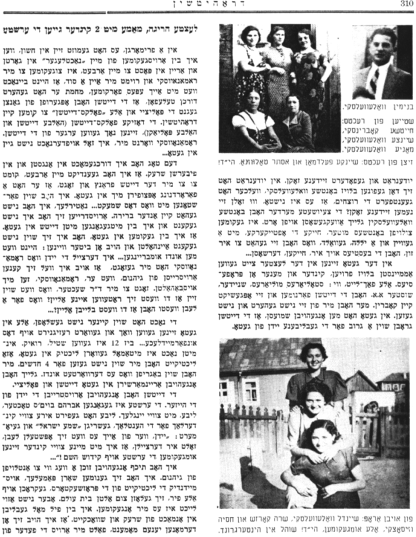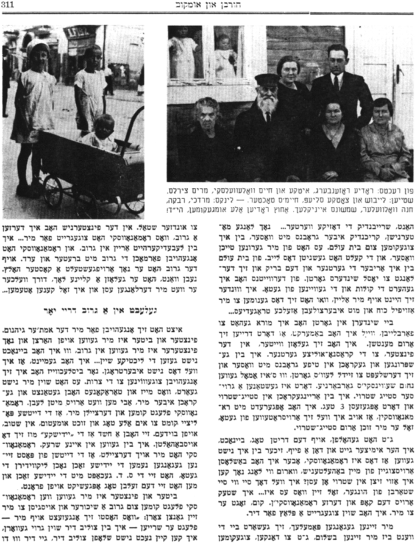
[Page 310]
Valevelsky on the spot. Her mother Chayka the pharmacist came running wailing and weeping, asking what happened to her son. The beasts then shot Chayka as well.
[photo:] Binyamin Valevelsky. Standing from right: Chaytsha Kobrinsky, Sheintsa Valevelsky, Manya Valevelsky. Seated from right: Sheinka Feldman and Esther Taluvna. May G-d avenge their blood!
[photo:] From top to bottom: Sheindel Valevelsky, Sarah Karzh and Chasya Wisotsky. All perished. May G-d avenge their blood! The synagogue is in the rear.
In the latter period in the ghetto there remained only women, children and unskilled men. The Germans sent off all the tradesmen such as carpenters, bricklayers, tailors, shoemakers, etc. to Kobrin. We never heard or saw anything more from them. People in the ghetto started saying that the Germans were digging mass graves for the remaining Jews in the ghetto.
Last massacre – a mother and two children were the first
One morning, it must have been in the month of Cheshvan [October/November] when I left my night's lodging in the garden, and went to my job in the post office, Romanovski came to tell me a secret that something was going to happen that night. He heard over the telephone that the Germans had called the police and ethnic Germans from the entire region to come to Drohitchin. These so-called ethnic Germans were half German and half Pole and were worse than the Germans. Romanovski warned me not to return to the ghetto at night.
I spent the entire day in worry and feverish terror. When I finished work a German named Franz came to tell me that he had an order to take me to the ghetto. I now had a feeling of what was going on, but I had no choice. I couldn't get away, so I went with him to the ghetto. When I arrived in the ghetto, I couldn't restrain myself and started crying…..they were going to kill us today. I told Jews what Romanovski told me, i.e. that if I wanted to get away from the hell, Romanovski would hide me. Dr. Schechter responded by asking me what kind of life I would have if I were all alone.
No one slept that night, and everybody stayed awake and alert, but resigned to the inevitable. It was quiet until midnight, and then in the middle of the night the ghetto was flooded with light. We had never seen so much light in four months. We started imagining what was awaiting us. Then Germans and police started entered the ghetto.
The Germans started dragging people out of the houses. The first to go was Avraham Baum's daughter Liba and two children. Liba walked holding her children's hands, crying “Hear O Israel” and said to the others, “Jews, whoever remains alive must say that I and my children were the first to die for the sanctification of G-d's name!”
I immediately started looking for some way to escape from hell. I simply shuffled along, avoiding the light projectors. I crawled on all four, getting to the old cemetery. It

[Page 311]
wasn't easy for me to do, and I was often seized by fear and weakness. As I think about that moment, my pen falls from my hand as I write these words. After great hardship and crawling over holes and through water, I got to the cemetery. Rivers of water were flowing and the cold sliced through my body. From the cemetery I crossed the gardens and bridge, and got to Yossel Shinder's garden. From a distance I could hear voices and crying from the ghetto. Today I wonder about myself, about how I had so much strength and courage to live through such tragedies.
[photo:] From right: Rodia Rosenberg, Itka and Chaim Valevelsky, Miriam Tsirels. Standing: Leibush and Tsotka Sliep, Chaim's daughter. Left: Mordechai, Rivka, Chana Volveler, Shimshon's grandchildren. They all perished except for Rodia.
I was scared to remain in Shinder's garden because I noticed that there were people around there. I kept going in the dark until I got to the Krasna Ulitsa Gardens [Red Street Gardens]. I jumped and crawled through deep holes filled with water and dragged myself to Zeidel Lev's garden, where Nachum Shevinsky's tannery used to be. There was a large straw stack. I crawled into the stack and stayed there for three days. I had arranged with Romanovski that if I were to survive the ghetto, he should look for me around straw stacks.
G-d helped me, and on the third day in the evening I heard someone walking around, and then a whistle. I wasn't sure it was Romanovski, but I decided to come out of hiding. How long could I sit in straw and not eat anything? In any case I would die from hunger – so what difference would it make? I stuck my head out and recognized Romanovski. He told me to come and that he had a place for me.
We walked slowly, staying close to the wall, and thank G-d we arrived at our stable. In the darkness I could see a pit that Romanovski had prepared for me. I went down into it, and Romanovski covered it over with earth and boards. He placed a wooden crate on top. Next to the wall he left a small hole I could get air through, and through which he could pass food.
I lived in a pit for three years
I now started to live through a real hell. My heart was dark and bitter, and it was even darker in the pit, where at night I didn't have the slightest bit of light. I figured that I wouldn't survive. But gradually I got used to the suffering, and no longer was bothered by the tarantulas and mice that danced and crawled over me, as long as they would let me survive. Romanovski would come and tell me that the Germans at the post office were grabbing Jewish property after the ghetto was liquidated, and the SD had caught them with Jewish property and sent them to the front the same day.
It was painful when Romanovski would come to the pit intoxicated and pour his wrath on me. “Why are you imposing on me?” he would scream. “I have already turned gray because of you. I can't sleep at night because of you. Go wherever you want!
Previous Page |
Next Page
JewishGen, Inc. makes no representations regarding the accuracy of
the translation. The reader may wish to refer to the original material
for verification.
JewishGen is not responsible for inaccuracies or omissions in the original work and cannot rewrite or edit the text to correct inaccuracies and/or omissions.
Our mission is to produce a translation of the original work and we cannot verify the accuracy of statements or alter facts cited.
 Drogichin, Belarus
Drogichin, Belarus
 Yizkor Book Project
Yizkor Book Project
 JewishGen Home Page
JewishGen Home Page
Copyright © 1999-2025 by JewishGen, Inc.
Updated 13 Dec 2001 by LA